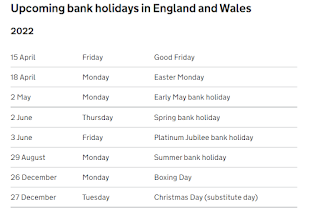NHS Leave
This post aims to give some basic ideas and concepts of leave for SHO in the NHS system. Kindly refer to your trust guideline for it too.
Annual Leave
•Most SHO’s annual leave entitlement is 27 days over one year which equates to 13 ½ days over 6 months (which we round up to 14 days) or 9 days over 4 months in addition to any lieu days owed for bank holidays worked or that fall on a fixed leave day (e.g. zero-hour day)
Tips: Maximise it by using zero-days and weekends
• Most trust has a policy that the leave application must spread their annual leave across all different posts i.e. 9 days in each 4-month post.
• All annual leave and lieu days should be arranged within the ward blocks.
• All on-calls including evening ward cover shifts must be swapped.
• All planned leave arrangements, whether study/annual/lieu/other, must be approved by the consultant you will be working for at the time of the leave in order to ensure appropriate cover is in place. Any leave ‘approved’ by other consultants is invalid and is likely to be denied at short notice as appropriate cover may not be in place.
• All planned leave arrangements, whether study/annual/lieu/other, should be requested at least 6 weeks in advance, although leaves may be approved with less notice if cover arrangements are in place.
Un-Planned Leave (inc sickness and special leave e.g. carers/compassionate)
If you are ill and cannot come to work, or cannot come to work for any other reason, you MUST notify your team at/before 9am (8am if shift starts at 8am)
1. Ideally consultant
2. Rota co-ordinator
3. Relevant clinical lead
• On your return to work, you MUST meet the relevant rota coordinator or manager and complete the relevant leave paperwork.
• For sickness absence this will be the return to work discussion form and self-certificate or doctor’s certificate (a doctor’s certificate is required for sickness absence over 7 calendar days whether scheduled to work or not inc days that fall on a weekend)
• For special leave this will be the request for a special leave authorization form.
• Carers’ leave is intended to provide a compassionate response to emergency unexpected and unplanned family caring needs. Carers’ leave of up to 3 days (pro-rata for part-time staff) per financial year may be granted. As this leave is intended to provide an immediate response, 1 day will be sufficient per occasion.
• Compassionate leave is intended to provide a compassionate response when staff suffers bereavement involving an “immediate” or “close” relative. Details of definitions of “immediate” or “close” relative and the maximum time allowed can be found in the special leave policy available on the trust intranet.
Bank Holiday
You can refer to https://www.gov.uk/bank-holidays




Comments
Post a Comment